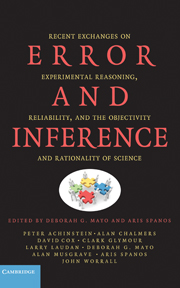 Error and Inference
Error and Inference Book contents
- Frontmatter
- Contents
- List of Contributors
- Preface
- Introduction and Background
- 1 Learning from Error, Severe Testing, and the Growth of Theoretical Knowledge
- 2 The Life of Theory in the New Experimentalism
- 3 Revisiting Critical Rationalism
- 4 Theory Confirmation and Novel Evidence
- 5 Induction and Severe Testing
- 6 Theory Testing in Economics and the Error-Statistical Perspective
- 7 New Perspectives on (Some Old) Problems of Frequentist Statistics
- 8 Causal Modeling, Explanation and Severe Testing
- 9 Error and Legal Epistemology
- Index
Preface
Published online by Cambridge University Press: 29 January 2010
- Frontmatter
- Contents
- List of Contributors
- Preface
- Introduction and Background
- 1 Learning from Error, Severe Testing, and the Growth of Theoretical Knowledge
- 2 The Life of Theory in the New Experimentalism
- 3 Revisiting Critical Rationalism
- 4 Theory Confirmation and Novel Evidence
- 5 Induction and Severe Testing
- 6 Theory Testing in Economics and the Error-Statistical Perspective
- 7 New Perspectives on (Some Old) Problems of Frequentist Statistics
- 8 Causal Modeling, Explanation and Severe Testing
- 9 Error and Legal Epistemology
- Index
Summary
A central question of interest to both scientists and philosophers of science is, How can we obtain reliable knowledge about the world in the face of error, uncertainty, and limited data? The philosopher tackling this question considers a host of general problems: What makes an inquiry scientific? When are we warranted in generalizing from data? Are there uniform patterns of reasoning for inductive inference or explanation? What is the role of probability in uncertain inference? Scientific practitioners, by and large, just get on with the job, with a handful of favored methods and well-honed rules of proceeding. They may seek general principles, but largely they take for granted that their methods “work” and have little patience for unresolved questions of “whether the sun will rise tomorrow” or “whether the possibility of an evil demon giving us sensations of the real world should make skeptics of us all.” Still, in their own problems of method, and clearly in the cluster of courses under various headings related to “scientific research methods,” practitioners are confronted with basic questions of scientific inquiry that are analogous to those of the philosopher.
Nevertheless, there are several reasons for a gap between work in philosophy of science and foundational problems in methodological practice. First, philosophers of science tend to look retrospectively at full-blown theories from the historical record, whereas work on research methods asks how to set sail on inquiries and pose local questions.
- Type
- Chapter
- Information
- Error and InferenceRecent Exchanges on Experimental Reasoning, Reliability, and the Objectivity and Rationality of Science, pp. xiii - xviiiPublisher: Cambridge University PressPrint publication year: 2009


